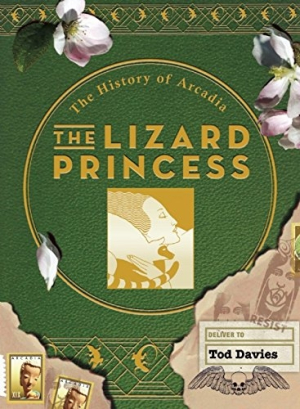The Lizard Princess
Examining society through the lens of a fairy tale, this fantasy quest lends a hand toward making our contemporary world a little better.
Fairy tales are quite often relegated to the realm of children. And while they might make for good bedtime stories, they can equally serve as critiques of the more-difficult-to-discuss aspects of society. Tod Davies’s The Lizard Princess is the coming-of-age story of a princess on a quest to find a missing key once possessed by her mother, the late queen of Arcadia. It is also a brilliant polemic on the destructive forces of patriarchy and capitalism, and the obsession humanity has with besting death.
After finding herself transformed from the waist down into a lizard, after a game of chess gone awry, Princess Sophy sets out with her lemur companion Leef to find a way to reverse the spell. Of course, the path of fairy-tale quests never runs smoothly. In the course of her adventures, Sophy stumbles through the Dead Wood, lives in the slums of Megalopolis, and works on the perfect False Moon. She also finds the love of her life, meets her long-lost father, accepts her fate to find the missing Key, chats with Death herself, and comes into her own as the queen of Arcadia.
The Lizard Princess holds all the hallmarks of a good fairy tale—a princess on a quest, a daring hero, a curse, magical creatures, a fairy godmother (of sorts), an evil witch, talking animals—but these elements simply sit atop a deeper critique of society. Megalopolis provides a harsh look at the direction in which society is headed: a population hooked on anti-aging pills, diet pills, mood stabilizers, and drugs to suppress every quirk a child might exhibit … a society solely focused on expanding, with no appreciation for the destruction to the environment these actions cause, which has created a place that’s the perfect artificial environment but where life cannot seem to thrive. It is set up in direct opposition to Arcadia. Patriarchy versus matriarchy, industrial farming against organic, a desire to conquer death and an understanding that death and life go hand in hand.
The story is never heavy-handed and offers no easy answers. It is fairy tales such as this that may allow us to examine our own world with a critical eye and perhaps even change it for the better.
Reviewed by
Allyce Amidon
Disclosure: This article is not an endorsement, but a review. The publisher of this book provided free copies of the book to have their book reviewed by a professional reviewer. No fee was paid by the publisher for this review. Foreword Reviews only recommends books that we love. Foreword Magazine, Inc. is disclosing this in accordance with the Federal Trade Commission’s 16 CFR, Part 255.

